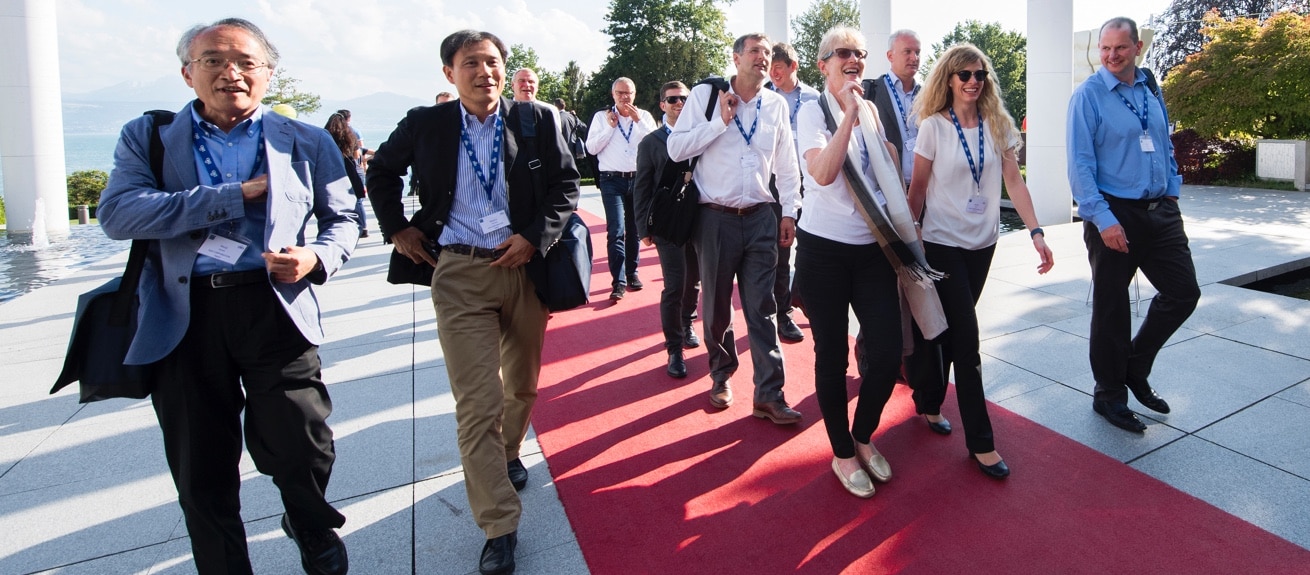
There was a double celebration at this year’s Orchestrating Winning Performance. Paolo Zegna, the Chairman of Ermenegildo Zegna was invited in honor of the 20th anniversary of the IMD Global Family Business Award and, at the same time, the CISCO-IMD Global Research Center for Digital Business Transformation was officially launched.
Although the worlds of luxury menswear and information technology could not seem farther apart, the challenges they face are not dissimilar. Disruptive technology, such as Uber and Airbnb, can introduce unpredictable changes overnight.
“40% of the companies that are not addressing digital transformation at the board level will disappear,” predicted Martin McPhee, Senior Vice President of Cisco Consulting Services.
Paolo Zegna, who has chaired Ermenegildo Zegna since 2006, ventured that his company would not escape the trend. “By 2020, 50% of clothing will apparently be sold on the internet,” he said.
Since it was founded as a fabric manufacturer in Trivero in the north of Italy in 1910, Ermenegildo Zegna has grown into a global purveyor of fine garments for men with distribution channels in 100 countries and 523 mono-brand stores. Its annual turnover was 1.2 billion euros in 2014, 92% of it outside of Italy.
Third generation Paolo Zegna mentioned the difficulty for some family businesses to convince younger family members to stay in the business, but in the case of his company, digital transformation was the key to attracting a member of the fourth generation of the Zegna family back from the US, where he had founded a digital start-up with a $35 million turnover within three years.
“It’s a new challenge with great potential,” he said, making it however clear that he did not yet know how this development would be reconciled with the values of the company.
Values, the fuel of family businesses
From the very beginning founder Ermenegildo Zegna applied the principle of highest quality in all areas: the materials, the machines and the manpower. He believed in Italian creativity and refused to allow his products to be labeled otherwise, despite a greater potential for sales had they been marked: “Made in the UK.” With a powerful intuition for branding, his name was present on all the products with a distribution in more than 45 countries by 1940.
Ermenegildo’s visionary entrepreneurship was not limited to the business, since he believed in corporate social responsibility before it even had a name. As early as the 1930s, he created a welfare center, professional schools and sports facilities for his employees.
Fondazione Zegna was set up in 2000 to perpetrate the values of the pioneering founder. It is dedicated to the protection of the natural environment, social wellbeing and the cultural development of the local community.
An immediate off-shoot was Oasi Zegna for the massive reforestation of the mountains near the Zegna Wool Mill in Trivero and the founding of a small ski resort, Bielmonte. “This has become an alternative industry in the area,” Zegna pointed out.
On the educational front, the Ermenegildo Zegna Founder’s Scholarship was launched in 2014 to enable young Italians to undertake one to three years of post-graduate studies or research abroad, provided that they bring their know-how back to Italy.
“We believe there is an incredible need for knowledge, and we want to help people in our country,” said Zegna.
Closing the value chain
Regarding the vertical integration that has contributed to the enduring success of the company, it was put in place almost by accident by Ermenegildo Zegna, his grandson revealed: it happened from the bottom up, beginning with a wool mill.
“Originally, we only sold fine fabric, but when tailors started to disappear, we thought about the future and decided to produce the suits ourselves.” Zegna explained that every step was decided to get closer to the customer.
A large selection of accessories and licensing agreements with other prestigious brands were developed for the same reason. “We were lucky. We have associations with people like ourselves who like to learn from others. And we remain open and curious to see what they do better than us.”
Due to a very early move into China, where the company already purchased its fine cashmere, the country represents one third of the Zegna group’s turnover.
“We never treated it as a secondary market,” said Zegna, who marvels at the degree of sophistication that the Chinese have acquired in recent years. But now that they have started to travel extensively, Zegna’s fortunes in that country could change.
“Because we try to think earlier than others, we’re not afraid to make mistakes. We try to do the best we can do and believe that complexity gives us the highest learning curve.”
The Zegna group supplies garments to Armani, Versace, Gucci and Tom Ford, among others, 95% for men.
By recently purchasing a majority stake in Australian superfine wool producer Achill, the company has closed the value chain circle. “We now go from sheep to sheep,” he quipped.
Thinking in advance
Zegna explained that his board of directors is split half and half between family members and four outside board members “who understand the family business.”
“With private ownership, there is a longer term vision in what we can do and are allowed to do. A new generation is coming up through the ranks, so we are asking ourselves what will be useful for the company in ten year’s time, what will it be like in their hands in 15 year’s time.”
“The best way to attract new talent to the company is to offer a challenge, to say: I have a project.” Digital transformation is one of them.The Zegna group was awarded the IMD-Lombard Odier Global Family Business Award in 2000.



